Article Contents
Introduction
One of the major concerns of institutes while conducting online exams is the potential for cheating due to the lack of human invigilation.
However, the use of technology in online exams offers a range of features and tools that can help prevent cheating and ensure the integrity of the exam.
One of the advantages of online exams is the ability to use AI proctoring and other monitoring techniques to detect and prevent cheating. These systems can provide real-time analysis of student behaviour during the exam, alerting educators to any suspicious activity and allowing them to take appropriate action.
In addition, online exams can also use security measures such as authentication and encryption to protect the exam from unauthorized access and ensure the confidentiality of the exam material. This can help prevent students from sharing exam answers or accessing unauthorized resources during the exam.
Overall, while there will always be the risk of cheating in any exam, online exams offer a range of features and tools that can help prevent and mitigate the risks of malpractice.
By using technology to enhance the security and integrity of online exams, institutes can help ensure that exams are fair and accurately reflect student performance.
Why do students cheat during online exams?
There are several reasons why students might cheat during online exams. Some of the most common reasons include:
- The desire to get a better grade or score on the exam
- The feeling of pressure to perform well on the exam, either from themselves or from others
- The belief that cheating is acceptable or even expected in certain situations
- The lack of understanding about the consequences of cheating and the importance of academic integrity
- The belief that it is easy to cheat during an online exam without getting caught
Overall, the reasons for cheating during online exams are complex and can vary from student to student.
However, a common factor is a desire to achieve a desired outcome without putting in the necessary effort or following the rules.
By addressing these underlying motivations and promoting academic integrity, educators and institutions can help prevent cheating during online exams.
Types of Remote Proctoring
1. Live online proctoring
In this type of remote proctoring, a proctor is assessing the candidate in real time via webcam, mic and access to the device’s screen.
2. Recorded proctoring
In this method, no proctor is assessing the candidate in real-time. The audio-video feed for the duration of the test is recorded. A proctor later goes through this feed and flags any malpractices noticed.
3. Automated Advanced Proctoring
In this type, there is no or minimal need for manpower. An automated system is programmed to monitor the candidate and detect any malpractices and flag them.
4. 360 Degree Proctoring
In this type of proctoring 2 way streaming is used to get a 360-degree view of the candidate during the online exam. You can see entire room or environment around the candidate with 2 cameras streaming
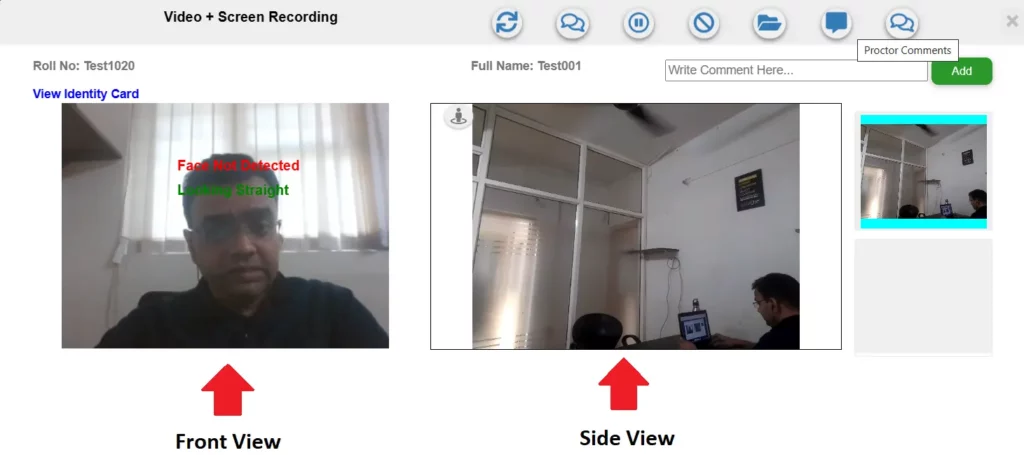
Here are the steps which are taken to prevent cheating in online exams:
1. Secure Browser

Security is an important aspect of the exam. A feature during the online examination process prevents the opening of another window or tab on the browser.
Secure Browser Technology prevents users from opening any other window while the online examination process is going on. The user is allowed to access only the examination window.
Access to keyboard shortcuts for copy, paste and screen capture is completely prevented.
When a candidate tries to open a new window, an alert is flashed which asks the candidate to revert to the exam window.
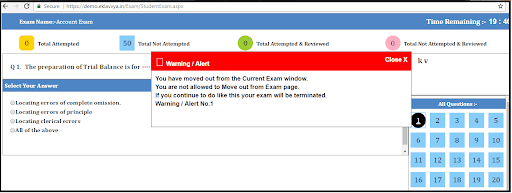
After 3 such alerts, the exam is terminated. It is also possible to customize this approach and the exam is terminated immediately after the candidate tries to open a new window.
Secure or Safe Browser can also be used to conduct remote exams. A safe browser is an exe file which is used to launch an online exam. It has many advanced features which can be helpful to conduct remote exams without any kind of cheating.
Features of Secure Browser APP
- Prevent HDMI Cable extensions
- Kill background screen sharing applications with ease
- Prevent unauthorized access to exams using remote logins
- Prevent users from opening any other background recording applications
- Facility to keep exam window always on top
- White list required application so that you can switch windows (e,g Excel for accounts calculation, R Programing app for analysis)
How does safe exam browser detect cheating ?
Safe Exam browser can help you to configure allowed applications during the exam. If your exam requires excel based calculations then you may allow excel application access during online exam. Safe Exam Browser configures application access accordingly.
Safe exam browser prevents users from connecting additional screen extensions during the exam to prevent cheating.
Safe Exam browser does not allow users to perform any other activity during the exam process. It is an open source browser specifically designed to conduct secure online exam activity.
2. Remote Proctoring
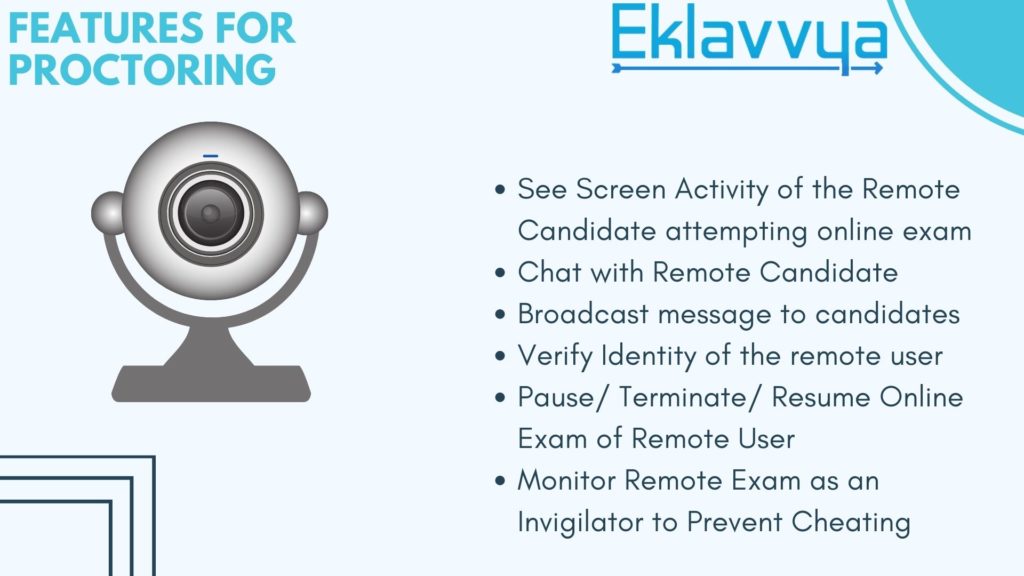
Remote Proctoring is a proctoring process in which a physical proctor is not required to be present in the room where the online exam is being conducted.
In a remote proctored test, candidates are monitored for the duration of the test via webcam, mic and access to the screen of the candidate’s device.
To take such a test the candidate needs:
- A suitable device such as a desktop PC, laptop, mobile phone, or tablet.
- Access to the internet.
- A functioning webcam and mike.
The following process takes place when a candidate appears for a remote proctored test:
1. Candidate Identity Verification
The identity of the Candidate is verified by Remote Proctor.
2. The candidate is Allowed to Appear for Online Exam
Upon identity, verification Candidate appears for the online exam.
3. Images and Video Capturing
Images and Videos of the Candidate are captured using a Web camera Attached.
4. Auto Proctoring
Auto Proctoring keeps track of key events of candidate movement, mobile phone usage, and suspicious audio to monitor the exam process.
Proctors can view live streaming of candidates attempting the exam.
While remote proctoring is not a totally new concept, 360-degree proctoring is something to which the majority of the institutes are not yet introduced. 360-degree proctoring is a cutting-edge reliable solution for administering online exams remotely without the fear of cheating.
It uses a dual-camera streaming ability to capture a complete view of the test taker’s environment and identity throughout the entire testing session. This ensures a high level of security and helps to eradicate the possibility of cheating or any malpractice by enabling the invigilator to monitor the premises around the candidate.
360-degree proctoring is one of the most advanced and innovative remote invigilation techniques that can enhance the quality and credibility of online exams.
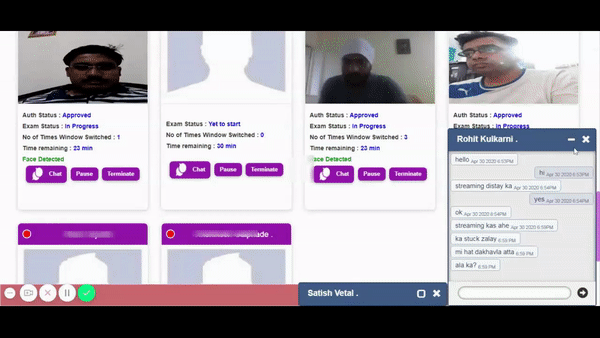
2. Object Detection during Online Exam
AI Proctoring can also help in detecting objects like mobile phone usage during online exams.
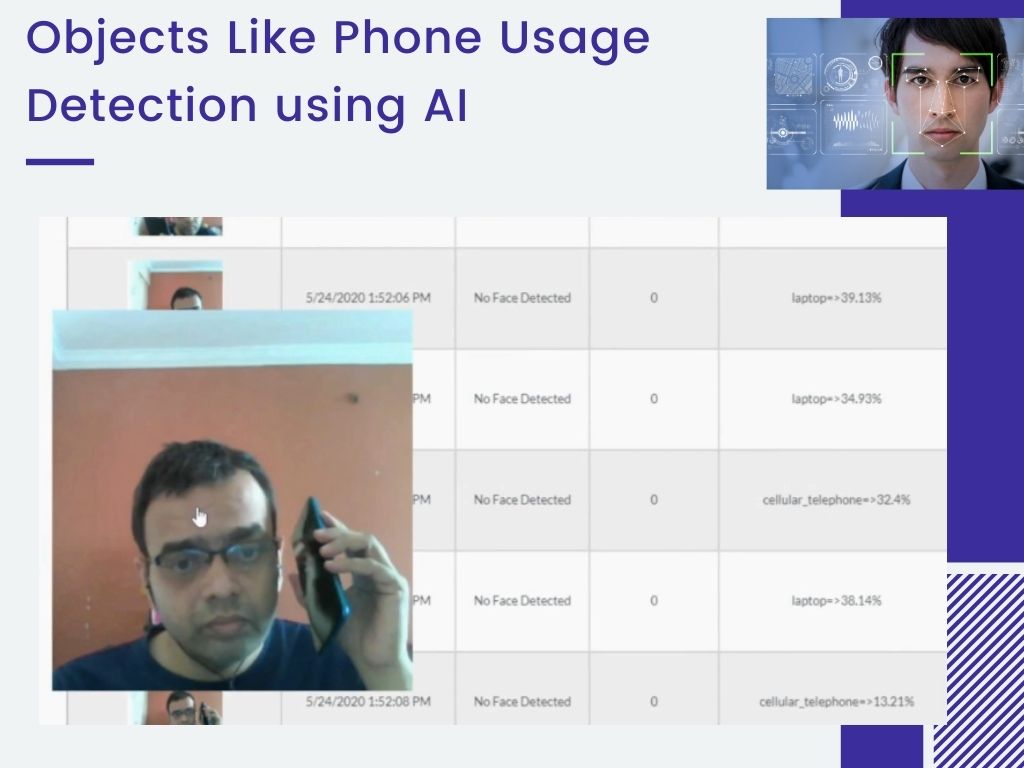
3. Remote Candidate Authentication
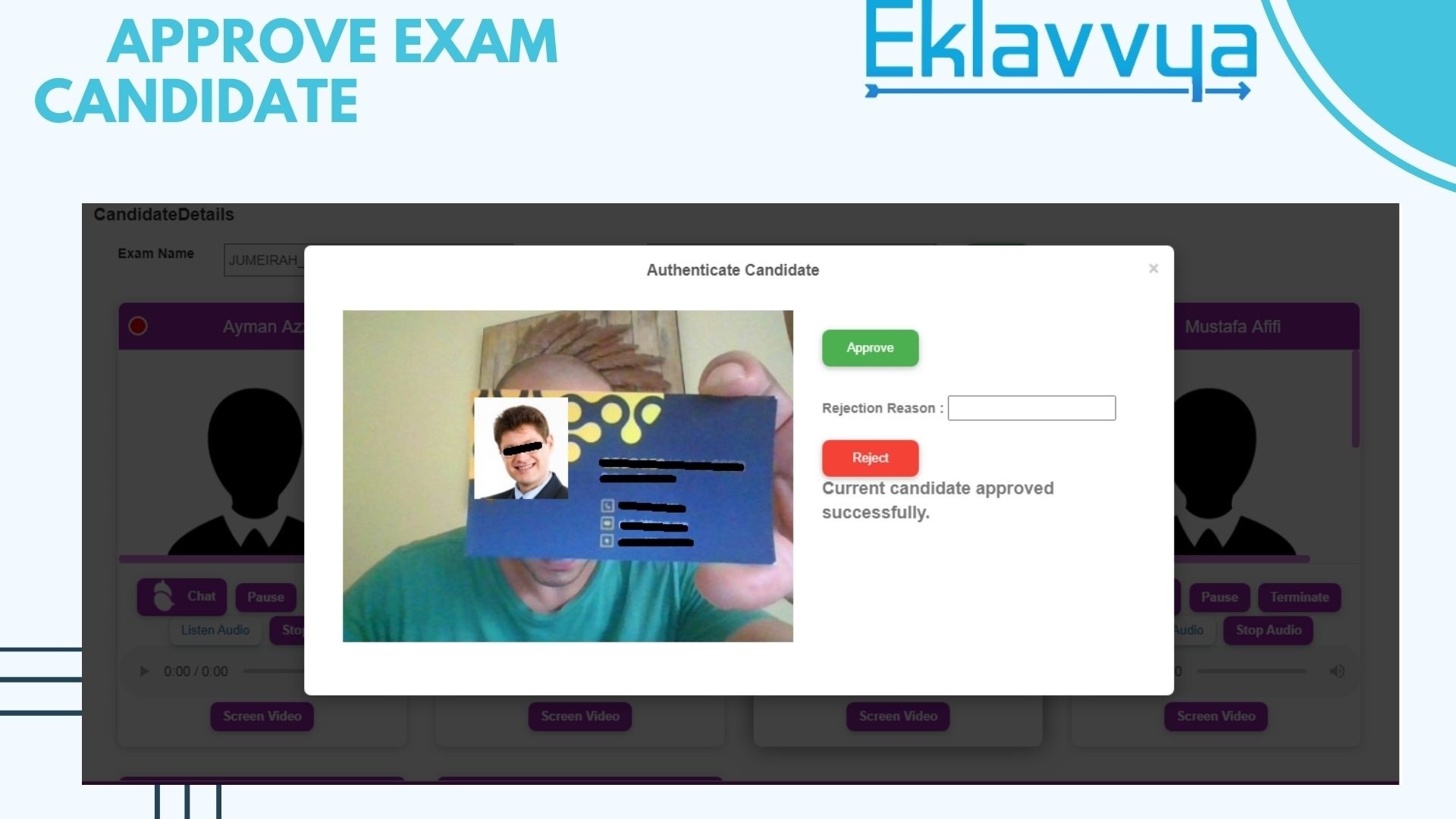
Candidate authentication is one of the primary steps of an online exam. The first step in an online examination is the verification of a candidate’s identity. For many institutes, a major concern while switching over to online exams is the authentication of the candidate’s identity.
Impersonation is one of the major forms of malpractice which take place in both online and offline examinations.
Eklavvya answers these concerns with its candidate verification system. It follows the following steps:
1. Candidate logs in to the system using valid credentials.
2. On Successful Login, the candidate is asked to enter a valid identity card number in the system
3. The system then validates this identity card number with the details provided during registration. For example, if the candidate has submitted their PAN number while registration, then the system will compare the entered details with the records available.
4. After the entered details are verified, candidates need to show their, say, PAN card to the remote proctor for verification.
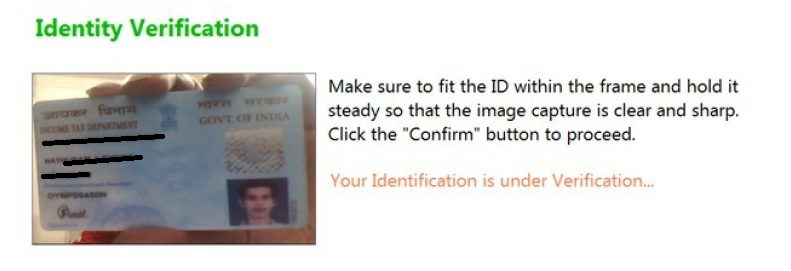
5. If the identity is not valid then the remote proctor may reject it. The candidate will have to redo the process of showing his/her ID to a remote proctor.
6. Only after the identity of the candidate is verified he/she is allowed to appear for the exam. The candidate activity is continuously streamed to a remote proctor for the duration of the online exam. The exam screen is also locked and the candidate cannot open a new window on the browser.
7. Proctor can initiate a live chat with the candidate.
8. The candidate can appear for the exam within the specified exam timeline. A remote proctor can monitor it and the system also records the duration of the online exam. This video recording of the candidate’s activity is available for auditing.
4. Data Encryption During Transit
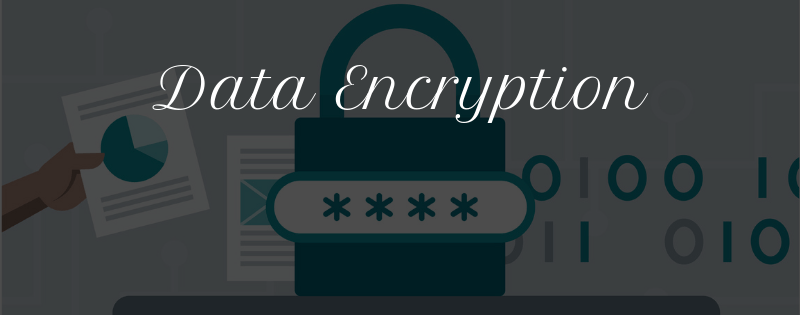
Eklavvya Online examination system’s data has been encrypted to prevent any kind of misuse. Question Bank and exam data are stored in a highly secure and encrypted manner.
Data encryption plays an important role in preventing unauthorized access to question banks. It also helps to avoid result manipulation and blocks access without valid credentials. It is a vital feature to ensure the security of the examination.
The entire communication between the server and the examination client is also encrypted with a secure mode of communication.
High-level encryption algorithms are used to encode the data which cannot be decoded easily.
This ensures the confidentiality of the question papers being exchanged between the server and the client.
The decoding can be done only by authorized personnel. This assures the security of the examination data to its maximum.
5. Exam Timer for Each Question

Some institutes conduct exams which have stipulated a time duration for each section or each question in the exam. Eklavvya provides a facility to set a timer for each question of the exam. In such a case, the candidate is unable to navigate questions.
A specific sequence must be followed while appearing for the exam. Each question will be allotted a specified time of e.g. 30 seconds/ 45 seconds/ 60 seconds for the attempt. If the candidate is unable to attempt the question in the specified time, the system moves on to the next question.
Here is one of the success stories of the leading university which prevented cheating during the online exam process with the help of a per question timer.
Bonus Tip: Online Exam Questions Strategy
Here are some strategies that educators and institutions can use to define online exam questions in order to prevent cheating:
> Use randomised question order and answer options. This can help prevent students from sharing answers or using other forms of collusion, as each student will receive a different version of the exam.
> Use open-ended or essay questions that require students to demonstrate their knowledge and understanding, rather than simply selecting a correct answer from a list. This can make it more difficult for students to cheat, as they will need to generate their own answers rather than copying them from elsewhere.
> Use adaptive or personalized testing, where the exam questions are tailored to each student’s abilities and performance. This can help prevent students from sharing answers, as each student will receive a unique set of exam questions based on their individual level of knowledge and understanding.
> Use strict security measures to prevent unauthorized access to the exam and protect the confidentiality of the exam material. This might include things like password protection, encryption, and other technical safeguards to prevent students from sharing exam answers or accessing unauthorized resources during the exam.
> Educate students on the importance of academic integrity and the consequences of cheating. Let students know that cheating is not tolerated and that they will be held accountable for their actions. This can help prevent students from attempting to cheat, as they will be aware of the potential consequences of their actions.
Addressing the Psychological Drivers of Cheating
It’s essential to understand the deeper psychological and societal pressures that drive such behaviors. By recognizing these underlying motivations, educational institutions can develop more targeted strategies to discourage cheating. For instance, addressing performance anxiety or the fear of failure can help students approach exams with confidence and integrity.
The Ethical Side of AI Proctoring
As we embrace advanced technologies like AI proctoring, it’s crucial to consider the ethical implications. While these tools offer enhanced monitoring, they also raise concerns about student privacy and data security. Institutions must ensure that while using such technologies, the privacy rights of students are not compromised. Transparent communication about how data is used and stored can alleviate student concerns.
Exploring Alternative Assessment Methods
Traditional exams, whether online or offline, might not be the only way to gauge a student’s understanding. Alternative assessment methods, such as project-based evaluations or open-book exams, can reduce the temptation to cheat. These methods not only test knowledge but also skills like critical thinking, research, and application. By diversifying assessment methods, institutions can offer a more holistic evaluation of a student’s capabilities.
Gathering Student Feedback on Online Proctoring
To make online proctored exams more effective and student-friendly, institutions should consider gathering feedback from those who’ve experienced it. Understanding student perspectives can offer insights into potential areas of improvement. For instance, some students might find certain proctoring measures intrusive or anxiety-inducing. By addressing these concerns, institutions can make the online exam experience more comfortable for everyone.
Promoting a Culture of Integrity
Beyond technological solutions, fostering a culture of honesty and integrity is paramount. Workshops, courses, or awareness campaigns emphasizing the value of genuine learning over mere grades can instill a sense of pride in academic honesty. When students understand the long-term benefits of authentic learning, they are less likely to resort to shortcuts like cheating.
Using Generative AI to Conduct Online Exams
You can use Generative AI to conduct online exams. In this setting, users are presented with questions related to a specific case study, topic, or scenario, and they need to respond by typing their answers. Based on the answers provided, the Generative AI system will pose subsequent questions tailored to the candidate.
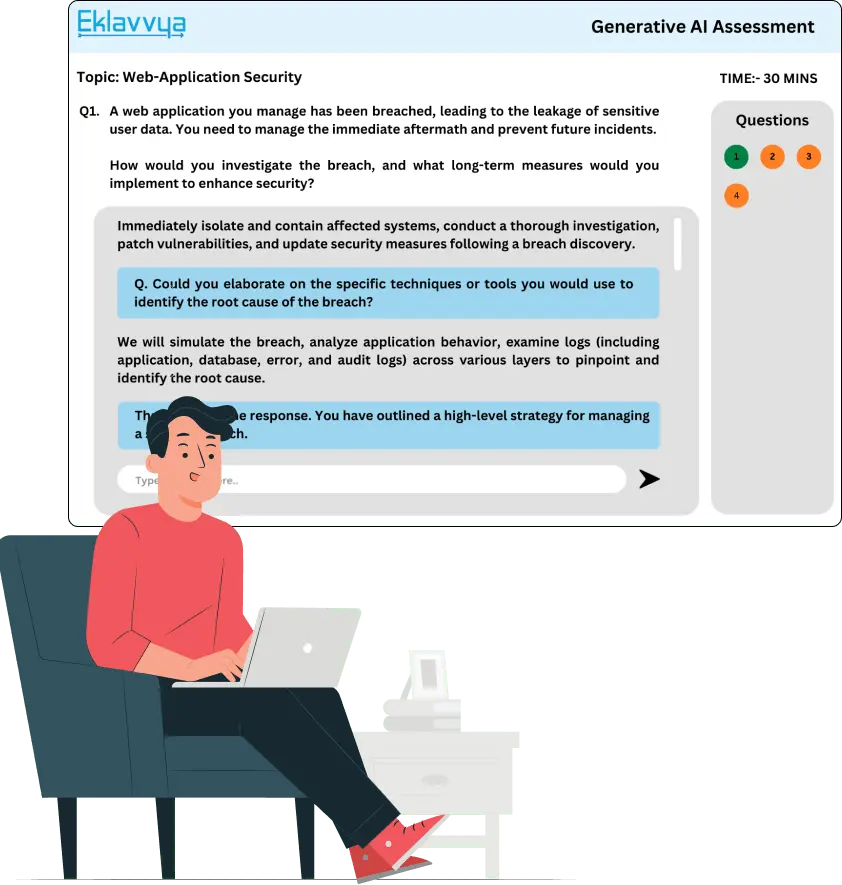
The candidate’s responses then guide the AI in formulating further inquiries. Upon completion of the interaction, the system provides a unique rating or feedback for the user. The questions asked are personalized and unique, ensuring they are not available on the internet or elsewhere.
This customization even applies when two candidates are sitting next to each other; each will receive different questions because the Generative AI considers the context and responses of each user. This approach enables the conduct of a distinctive exam for each student, effectively helping to prevent cheating
By following these strategies, educators and institutions can define online exam questions that are effective, engaging, and difficult to cheat on. This can help promote academic integrity and ensure the fairness and validity of online exams.
Listen to this article as a Podcast
Frequently Asked Questions About Online Exams Cheating Prevention
Can Safe Exam Browser Prebent Online Exam Cheating ?
Safe exam browser can certainly help you to prevent cheating during online exam.
It has many useful features including prevention of access to other applications, prevention of split screen using screen extension, and controlling user access to the computer device during online exam activity.
How to prevent students from cheating in online exams?
The cheating or any sort of malpractice can be prevented with the help of remote proctoring services.
Remote proctoring is the process of authenticating or authorizing the identity of the student appearing for exam and controlling cheating or malpractices with the help of image capturing of the student through webcam, IP based audit logging to prevent any unauthorized access.
Secure browser to prevent switching between the browsers, a proctor continuously examining the student through webcam and an option for live chatting with the remote proctor.
How to conduct online exam?
Online exams are conducted virtually. These exams can be launched on either personal computer or mobile phones.
The students appearing for exams receive links along with the credentials using which they can login and give the exams.
The online exams can be both objective and subjective type. The results or score of these exams can be calculated onscreen automatically or manually. The feature of Artificial Intelligence based proctoring will prevent the students from carrying out any kind of malpractices.
How will you prevent candidates from cheating in the online examination as a proctor?
As a proctor you get to see live streaming of the user. Proctor can do following things
- Live Chat with candidate
- Pause / Resume/ Terminate Exam
- Monitor Live Screen Activities
- Listen to audio around candidate
Candidate can be sent couple of warnings on live chat if it is found that candidate is looking around or speaking with someone or any other person is present along with candidate. All such things are recorded as a evidence and exam can be terminated by the proctor.
Proctor can also broadcast warning messages to all candidates. Proctor can ask candidates to show 360 degree view of the room to ensure no other person or any electronic devices are present in the room.
How to manage anti cheating online test ?
You can design test for anti cheating in a following manner.
> Define per question timer
> Assign proctor for live monitoring and live chat with remote users
> Use Secure Brower App to prevent user from using HDMI extensions or screen sharing third party applications
> Record exam sessions for evidence of malpractice
> Use Artificial intelligence driven Proctored Exams to prevent malpractices.
Can you cheat on a video-proctored exam?
It is possible to cheat on a video-proctored exam, just as it is possible to cheat on any other type of exam. However, video proctoring can help detect and prevent cheating by using AI algorithms and machine learning to monitor and evaluate student behavior during the exam.
Video proctoring systems can analyze a student’s movements and actions during the exam, looking for any unusual or suspicious behavior. For example, a video proctoring system might flag a student who is looking away from the screen for long periods of time, accessing unauthorized materials, or attempting to communicate with others during the exam.
If the video proctoring system detects any suspicious behavior, it will alert the educator, who can then take appropriate action. This can help prevent cheating and ensure the integrity of the exam.
However, it is important to note that no system is foolproof, and some students may still find ways to cheat on a video-proctored exam. Therefore, it is important for educators to use a combination of tools and strategies to prevent and detect cheating, including video proctoring, authentication, and other security measures.
How to prevent identity impersonation during online exams?
To prevent identity impersonation during online exams, there are several steps that educators and institutions can take:
Use authentication and verification procedures to confirm the identity of each student before the exam begins. This might include things like requiring students to provide a government-issued ID, a photo of themselves, or other identifying information.
Use video proctoring and other monitoring technologies to detect and prevent impersonation during the exam. For example, a video proctoring system might require students to show their face and ID during the exam, and flag any instances where a different person appears on camera.
Implement security measures to prevent unauthorized access to the exam. This might include things like password protection, encryption, and other technical safeguards to prevent unauthorized individuals from accessing the exam.
Educate students on the importance of academic integrity and the consequences of impersonating someone else during an exam. Let students know that they will be held accountable for their actions, and that impersonating another person is a serious offense.
By taking these steps, educators and institutions can help prevent identity impersonation during online exams and maintain the integrity of the exam process.
Guidelines to reduce the risk of cheating in online examinations
- Design Question Paper in such a way that candidate need to use analytical ability even for theory based question.
- Multiple choices provided in the exam should be intelligently design to promote critical thinking and problem solving.
- Keep Per Question Timer for the exam.
- Disable Question Navigation for the exam. Candidate must answer question and move to next. Candidate can not move forward or backward during exam process.
We have been using the Eklavvya platform to conduct exams. The interface is very user-friendly, Remote proctor can pause or terminate the exam if any malfunction occurs from the student side, Proctor can listen to audio of students, Evaluation interface for subjective answers is very simple for teachers, Compilation and Generation of result is too fast and accurate. Our teachers really enjoyed eklavvya platform for the conduction of online exam.
Delhi Public School
Exam in charge
We are extremely happy with the service and support you have provided us during online exams. This is the first time we have taken online proctored exams and it went very smoothly. The management feels grateful as we realize that the project couldn’t have been done successfully without your support. Thank you once again. We appreciate you and your team.
Dr. Chandra Sekhar Vasamsetty
Associate Professor in CSE, S R K R Engineering College






![How Government-Led Exams at 250+ Locations Are Setting New Standards of Integrity [Case Study]](https://www.eklavvya.com/blog/wp-content/uploads/2024/04/Enhancing-Exam-Integrity-Government-Certification-in-250-Locations-150x150.webp)
![Transforming Central Govt. Exams Evaluation: How Onscreen Marking is Leading the Charge [Case Study]](https://www.eklavvya.com/blog/wp-content/uploads/2024/04/How-Onscreen-Marking-Revolutionized-Central-Govt-Exams-Case-Study-1-150x150.webp)

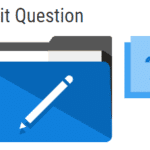
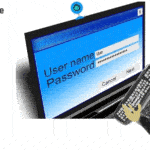
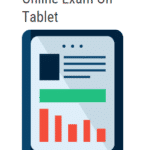










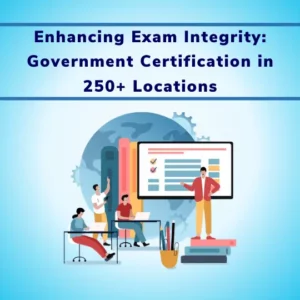
![How Onscreen Marking Revolutionized Central Govt Exams [Case Study]](https://www.eklavvya.com/blog/wp-content/uploads/2024/04/How-Onscreen-Marking-Revolutionized-Central-Govt-Exams-Case-Study-1-300x300.webp)
